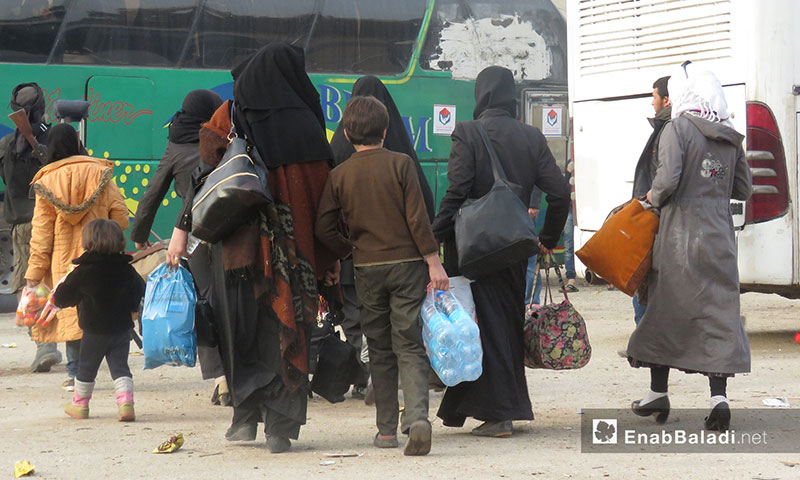



Hours separate the cities and towns of Eastern Ghouta from shifting to the Syrian regime’s control. This ensued after negotiations, through which Russia managed to conduct an agreement, providing for an entire departure of the factions from the middle sector, considered as the most prominent geographical part out of Assad’s forces military authority in the east of Damascus.
The city of Duma, however, was left out of the agreement, to yet face an unknown fate, being under the control of “Jaysh al-Islam,” which threatened to keep the fight on and refused to depart from the area, amidst talks about negotiations that include it and Russians.
During the joint Russian-Syrian campaign, the military map of Ghouta was splintered into three enclaves: Duma, Harasta and the middle sector, which includes Jubar, Zamalka, Ein Tarma and Hazeh. Assad’s forces controlled the entirety of the city of Harasta, which headed the departure negotiations, from which about 4 thousand civilians and fighters left in 85 buses, according to a census, which Enab Baladi managed to get from the city’s “local council.”
The fate to which eastern Damascus’ cities have settled, falls under the plan followed by the Syrian regime, in which it used the civilians as a pretext to penetrate the depths of the opposition-held areas, especially Asha’ri, Hamouriyah and Kafr Batna, which Assad’s forces have controlled in sync with the civilians’ departure.
Since the beginning of Assad’s forces military operation, on the 18Th of last March, there were talks about negotiations between the Russian side and the opposition factions, as to decide their destiny in the area, which was repeatedly reported by the “Russian Reconciliation Center” and denied by the factions.
Media sources informed Enab Baladi that denying the negotiations on the part of the factions and hiding the military reality from people played a role in affecting the psychological status of the towns in the middle sector, the town of Hamouriyah in particular, which triggered a group of civilians to exit the area towards the Assad’s forces area.
A massive withdrawal was witnessed by the factions, which in less than a month have lost 70% of the geographical area they were controlling, despite which the international community failed to reach a resolution as to cease fire and curb Assad’s forces progress.
On March 23, in correspondence to the Assad’s forces entry to the “strategic” Wadi Ein Tarma, “al-Rahaman Legion” announced an agreement, providing for the commitment of all the parties to the armed conflict in Ghouta to stop what Russia described as “acts of violence” under its auspice.
The Russian side guaranteed immediate evacuation of the wounded and patients with urgent cases to the hospitals in Damascus, starting from Sunday morning, March 25, resorting to the “Red Crescent” organization, at the people’s own discretion; it also guaranteed to keep them safe and that they would not be prosecuted by the government of the Syrian regime, to allow them the choice of returning to Ghouta or departing to northern Syria, after their recovery.
Russia guarantees to undertake all the proceedings needed to develop the humanitarian situation immediately and to facilitate the admission of the humanitarian convoys to the area. The guarantees also tackled the safe departure of militants with their families and light weapons if they wish to leave from the city of Arbin to Qalaat al-Madiq in Northern Syria, accompanied exclusively by the military Russian police.
Those who decide to leave are allowed to take light possessions, personal documents and devices (laptops, cellphones and cameras), in addition to their financial savings, without being subjected to personal search.
Russia also guarantees the protection of the civilians who wish to stay in Ghouta from the prosecution of the government of the Syrian regime, in addition to installing Russian military police points in the towns that are, in the present, under the control of “al-Rahman Legion,” which the agreement includes ــــ Ein Tarma, Jubar, Zamalka and Arbin.
Hours after the declaration of the middle sector’s agreement, the leader of “Jaysh al-Islam,” Isam Buedany (Abu Hamam), stated that his faction will stay in Ghouta and refuses to leave. “We are steadfast in Ghouta to the last drop; we have made our decision as not to leave it,” he said in a voice recording.
He added that the presence of who he described as “Mujahedin”(holy warriors) near the capital Damascus is a victory for the revolution, and it is necessary to preserve this force, represented by “Jaysh al-Islam”.
According to Buedany, “the attack on Eastern Ghouta is temporary; after which the nation will witness a grand victory.” He called on the factions in Southern Syria to take action to support Eastern Ghouta, pointing out that Assad’s forces military action will be directed at Daraa and Idlib after getting done with the Ghouta file.
Negotiations are conducted between “Jaysh al-Islam,” active in Duma, and Russia, as well as Assad’s forces.
A close source to the “Unified Command” (an umbrella under which Jaysh al-Islam performs), who wishes to be anonymous, told Enab Baladi that the “Command” in Duma initiated negotiations either with Russia or Assad’s forces.
According to the source, the negotiations provide for a ceasefire in Duma and not to evict the people from the city, in addition to an attempt at finding a political solution in the area which guarantee the people’s stay in it.
“Jaysh al-Islam,” nonetheless, denied its indulgence in such negotiations or coordinating with the Syrian regime, calling the information “rumors.”
if you think the article contain wrong information or you have additional details Send Correction